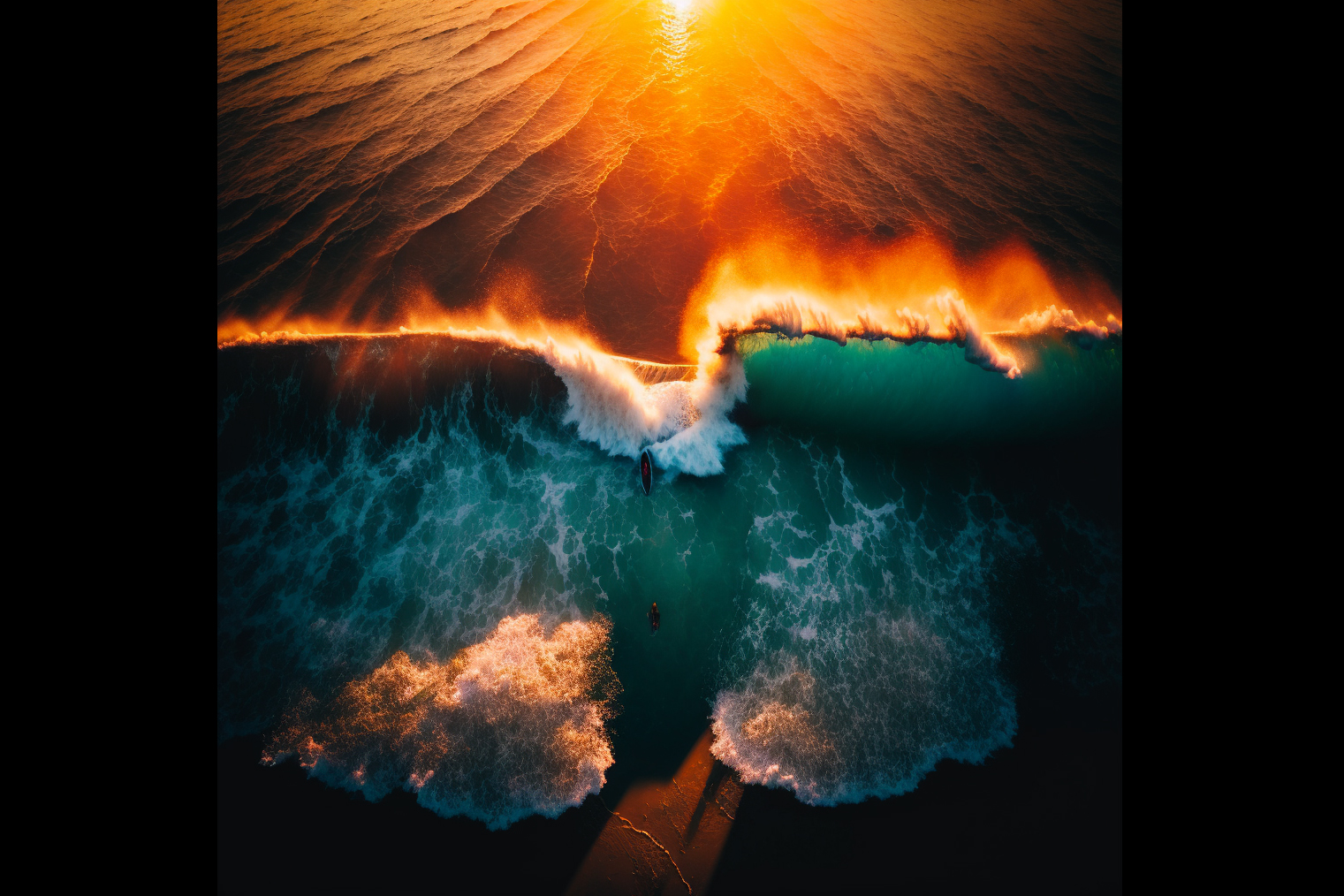A stunning image of surfers wading toward the sunrise has won a popular photography competition. Only this time, the photographer wasn’t human, and none of the scenes in the image actually happened—it was all created by one man, sitting on his couch, using artificial intelligence.
The two surfers you see in the middle? Neither of them are real. That glorious sunset? Fake, based on a million different stock photos. The image credit, Jane Eykes, is another jab at the unsuspecting viewer: Jan van Eyck was a 15th century artist, often dubbed the most stolen-from artist of all time. Fitting, then, that the image’s producer employed van Eyck’s namesake to use AI and “steal” inspiration to cobble together an entirely fake, entirely believable—albeit, award-winning—photo.
The crazy part is that none of the judges—or audience members—even noticed until the artist came clean.
The mastermind behind the image is Absolutely Ai, an “artificially intelligent art studio” opened just months ago in Sydney, Australia. Its founder, photographer and filmmaker Jamie Sissons, quietly entered his AI-generated drone shot into a summer-themed photography competition to prove a point: That artificial intelligence could generate images that not only blend in with photos captured by professionals, but also beat them out in a competition.
And Sissons did just that, taking the top prize in a competition hosted by DigiDirect, an Australian electronics retailer. Sissons says that Absolutely.Ai came clean to DigiDirect immediately after winning and forfeited the prize money—but DigiDirect is yet to respond, and the image is still posted on its Instagram account as of publication.
“We’re at a point now where machine may be the superior creator to man,” Sissons said. “Artificially intelligent technology has the capacity to learn from the masters of photography, painting and other creative endeavors to produce something entirely new and jaw-dropping. This technology is equally incredible and terrifying from a creator’s point of view.”
Controversy
Sissons’ competition win was not without controversy.
The award-winning image was made using a single computer prompt, and it didn’t require the meticulous planning and expensive equipment normally needed to capture such an image. Some artists see this as a revolutionary, democratizing advancement for the discipline, allowing more people to produce stunning imagery without financial or physical restrictions.
“The barriers to entry have never been lower,” Sissons said. “Go back to this image, our award winner: To get that same shot, you would have to have a drone. You would have to have access to the beach, most likely a car. It would take up a lot of time, and it would take a lot of resources to get that exact same image.”
It’s not the actual technology that photographers take issue with. In fact, some say that AI image generators or editors are simply more tools that can enhance the craft, akin to how Adobe Photoshop made it easy to alter images or how smartphones opened up the world of amateur photography.
What it really boils down to is trust, context and honesty—and local surf and ocean photographers say that that’s the biggest controversy with Absolutely Ai’s approach to proving the tool’s creative potential.
“This is not a technology issue, this is a people issue and how people use technology,” said local surf photographer Brian Feulner. “The only thing that [Absolutely Ai] proved is that people are going to do what they always do, and use technology to their advantage.”
As AI becomes increasingly capable of producing new images based on a simple prompt, many photographers fear that folks using AI won’t be forthcoming with how they generated their images, and if the imagery they produce is truthful. In the wrong hands, this tech could make believable but fake images of politicians or events that never happened.
READ MORE: People Are Not Happy That the SF Ballet Used AI-Generated Art To Promote ‘The Nutcracker’
And because of the way AI gathers huge swaths of information to spit out text or imagery, these generative technologies have opened up a slew of ethical questions surrounding usage rights and plagiarism. Sissons said it himself: The AI surfer photo was generated by copying little pixels, here and there, from millions of images freely available online. It’s groundbreaking because it’s an original way to make art, but hardly anything about the image is original in its essence.
So is it copying—and is it wrong? AI art advocates say no, and that creatives have openly drawn inspiration from many artists before them. But critics caution that a legal can of worms has been opened with the advent of image-generating technology, and that the industry is overdue for a reckoning with how to integrate artificial intelligence into art in a legal, respectful way.
“I think the more tools we have at our disposal, the better,” said Sachi Cunningham, a filmmaker and associate professor of journalism at San Francisco State University. “It’s how we use them that is worth examining, and towards what end that’s worth questioning. Your images could be used for a purpose that you didn’t intend—and this could be a photo that you took to illustrate some important truth that could be manipulated to tell an untruth.”
Of course, AI technology isn’t perfect, and both Feulner and Cunningham say that they’re shocked the DigiDirect judges didn’t question the quality or composition of the surfing image in the first place.
“The main thing that strikes me is that there’s no whitewater where the surfer is, and this surfer is kind of like Jesus walking on water,” Cunningham said. “If you know ocean dynamics, you know that water doesn’t just stop like that.”
What do you think? Here’s a side-by-side of some AI-generated photos from Sissons, compared with some from Feulner’s extensive surf photography portfolio:
